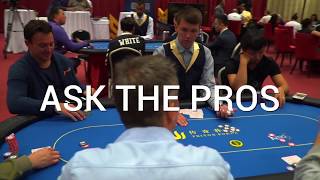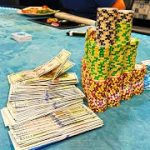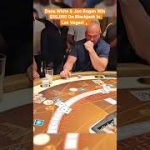Learn Poker Video Source & Info:
Watch and learn about visual tells from a stellar line-up of poker pros. Paul Phua picks the highlights from Sam Trickett, Fedor Holz, Steve O’Dwyer, Timofey Kuznetsov (aka “Trueteller”), Lucas Greenwood and Dan Cates (aka “Jungleman”). https://www.paulphuapoker.com/visual-poker-tells/
In this “Ask the poker pros” video, Sam Trickett, Fedor Holz, Steve O’Dwyer, Timofey Kuznetsov (aka Trueteller), Lucas Greenwood and Dan Cates (aka “Jungleman”) all share their considerable experience of visual tells with the Paul Phua Poker School.
SAM TRICKETT
For an intermediate player, like when I first looked at playing, I try and think what message is my opponent trying to give off. For example, if I’m sitting against him and I’m on the river and I’ve got a decision, I look at my opponent and I try and think what message he’s trying to give off to me. For example, if he’s trying to look weak, I’m probably more inclined to think he’s probably strong, because it’s hard for someone to have the confidence to look weak when they are weak. You know, to double bluff. It’s more common that people try and do the opposite to how they actually are. So I just try and look at my opponent, you know, whatever he’s doing, the way he’s moving, the way he’s talking, the way his eyes are looking, and try and get into his mind and see what message he’s trying to give off to me. There’s all sorts of little things. A lot of the time when they give speech play or some sort of movement or they are fidgeting around too much, they’ve more likely got a hand because when they are bluffing they don’t want to give too much away and if they are moving and fidgeting it’s like… they’re probably more likely to just sit still if they are bluffing.
FEDOR HOLZ
I think it’s mostly just the general feeling for how confident people are. That’s mainly what I rely on is, like, what’s my intuition about that person: is he more comfortable or not? I think this is like a general thing. Then over time you get more information about specific people, you create certain… it’s actually like certain buckets: this is how this behavior looks like, and then what I take from it, and then depending on more information I become more and more certain and apply my strategy regarding how certain I am.
STEVE O’DWYER
For people that are shaky it can be tough. Some people always are shaky because they’re just playing high stakes, and they’re playing over their head and they’re just always nervous. Some people are nervous and shaky when they have a big hand, some people are nervous and shaky when they have only a bluff and they’re super-calm if they have a good hand. So you just have to watch people closely, and over many, many hours kind of see, like, all right, is this guy the type that gets nervous when he’s got a good hand, or does he get nervous when he has a bad hand. Because usually it’s one or the other.
TIMOFEY “TRUETELLER” KUZNETSOV
The ones you’re going to explain easily will come from amateur players. The tells that an experienced player will do, they sometimes come from being careless a little bit. Just, like, they don’t care too much, they’re not focused enough and they give up something. This happens, but usually they don’t give up any big tells.
LUCAS GREENWOOD
It’s hard to describe, because normally I think it’s a combination of someone’s behaviour throughout the hand, and it’s more about noticing inconsistencies from pre-flop to flop, turn or river, and if someone for example is trying to represent a really big hand pre-flop and then the board comes out with a bunch of hands or a bunch of cards where, like, Aces suddenly isn’t even a very good hand and he is still going crazy at it, it’s more likely that they’re bluffing because it doesn’t really add up.
DAN CATES
It’s not just about tells whether you tell where they are bluffing or not. It can be a few things: it can be how they bet, it can be how they move, if they don’t move. More of what they do when they aren’t bluffing, actually, is more important. I think you need to pay attention to both to really tell whether someone’s bluffing or not. Because if someone’s moving freely when they’re not bluffing and then they’re totally still maybe when they are bluffing, then that would be how you might know.
For more ‘Ask the pro’s’ videos visit:
Or subscribe to be sure not to miss the next installment.
Source: YouTube








what is a curtin bucket?